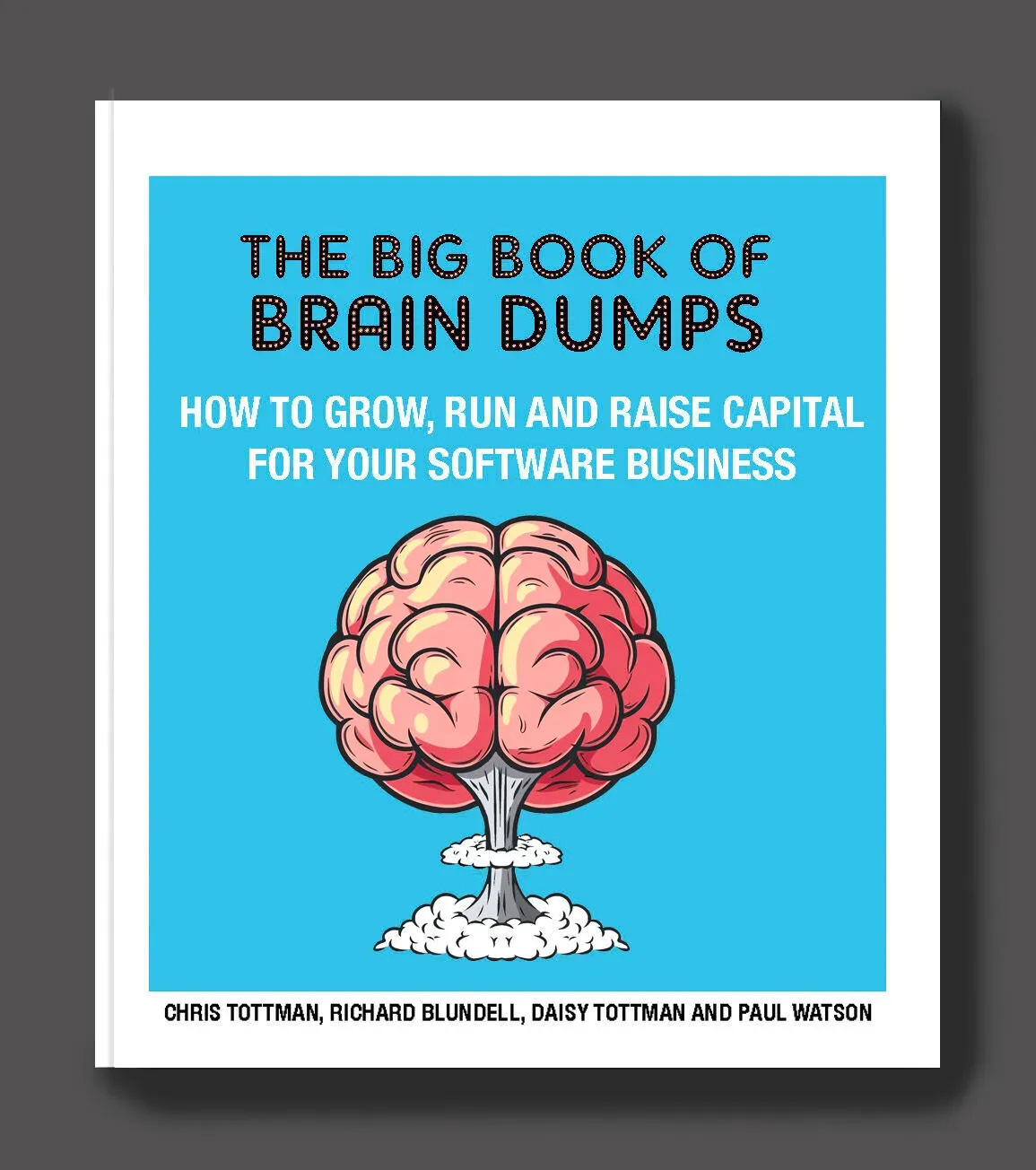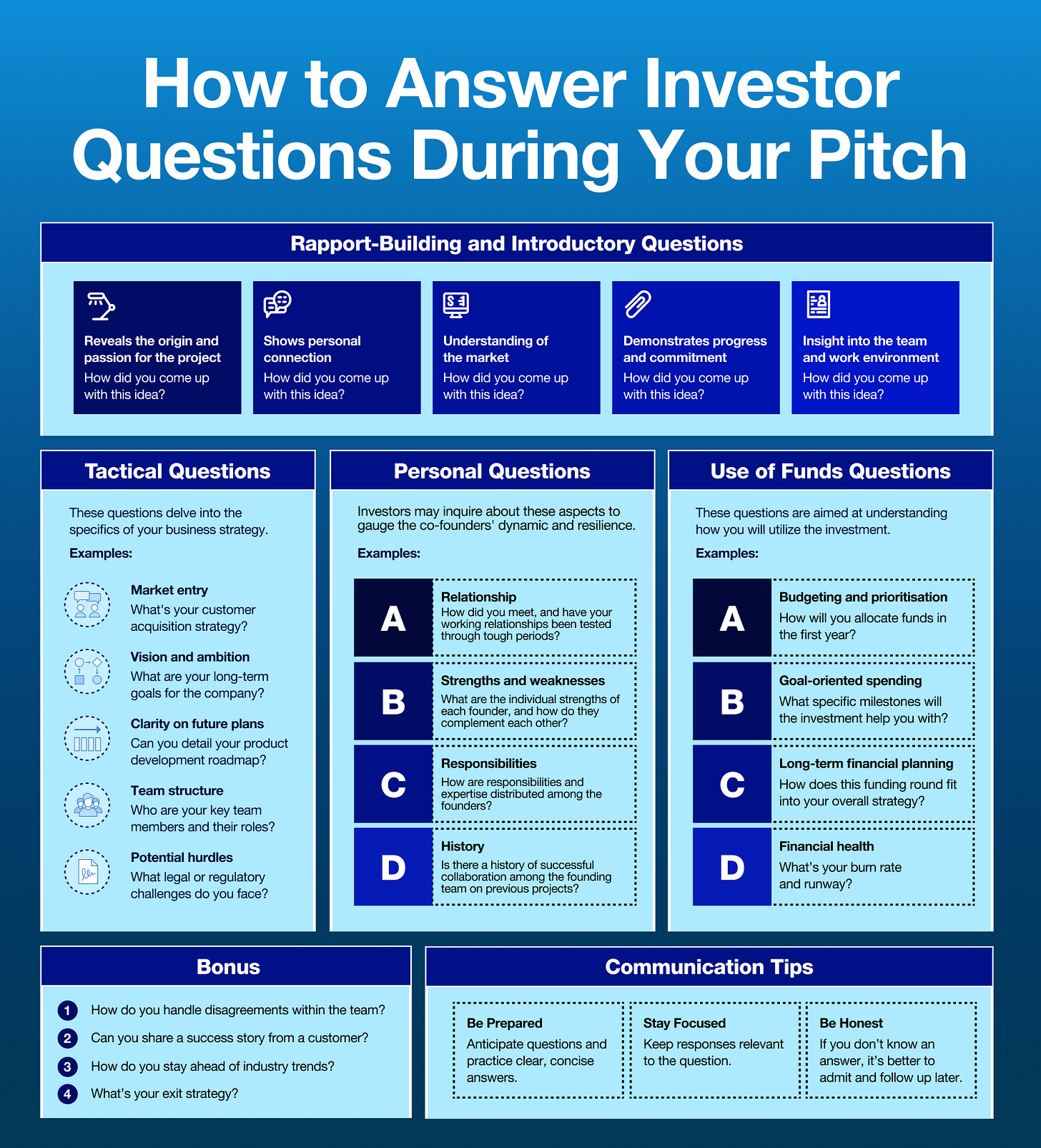🧠 What Investors Are Really Asking (And How Smart Founders Answer)
How to turn tough investor questions into your biggest advantage.
👋 Hey, Chris here! Welcome to BrainDumps—a weekly series from The Founders Corner. If you’ve been reading along, you know this series is a preview of a bigger project. Well, it’s finally here: The Big Book of BrainDumps is out now!
It isn’t a theory book—it’s the founder’s field manual. Inside, you’ll find 70 powerful frameworks distilled from 30+ years scaling software companies to hundreds of millions in ARR, 20+ years investing in 500+ B2B tech startups, and over $1B of shareholder value created. From raising capital to hiring your first VP of Sales, this book turns scars and successes into practical playbooks you’ll return to again and again. I expect most copies will become well-worn, scribbled on, and dog-eared—because it works.
Table of Contents
The Four Categories of Investor Questions
The Hidden Fifth Category: Investor Filters
How to Master Investor Q&A
Communication Habits That Build Investor Trust
Inside the Investor’s Mind
Bringing It All Together
You’ve delivered your pitch. The slides are sharp, the story lands, and the energy in the room starts to shift. Then comes the pause — and the first investor question.
This is where the real game begins.
Because while your pitch gets investors interested, it’s your answers that convince them to invest. The Q&A isn’t an afterthought — it’s the moment investors decide whether they trust you, your logic, and your leadership.
The founders who handle this part well don’t just memorise answers; they understand intent. They know that every investor question hides a deeper one: Can I trust this founder with my capital, my time, and my reputation?
If you can listen for what’s beneath the question and respond with authenticity, you’ll turn the Q&A from a test into a conversation — and from a conversation into conviction.
The Four Categories of Investor Questions
Investor questions aren’t random. They fall into four main categories — each designed to explore a different part of your business, your mindset, and your maturity as a founder.
1. Rapport-Building and Introductory Questions
These are the questions that sound soft and conversational — but they’re packed with meaning.
Expect to hear things like:
“How did you come up with the idea?”
“What progress have you made so far?”
“How did the founding team come together?”
Investors start here for one reason: they want to understand you.
They’re trying to gauge whether your connection to the problem is deep enough to survive the inevitable pain of scaling a company. They want to see that this isn’t just an opportunity — it’s a mission.
Your goal is to tell a short, authentic story that connects your experience to the problem you’re solving. Something like:
“I spent five years watching small finance teams drown in manual reconciliations. The frustration of that inefficiency became the foundation for this company.”
That answer shows lived experience, emotional investment, and focus — three traits that make investors lean forward.
2. Tactical Questions
Once investors connect with the why, they’ll move to the how.
These questions test your strategy, market understanding, and operational clarity.
Expect things like:
“How are you entering the market?”
“What’s your customer acquisition strategy?”
“What are your biggest risks?”
“Who are your competitors, and how are you different?”
What they’re really asking is: Do you know how to execute?
Founders often overcomplicate their answers here. Investors aren’t looking for flawless plans — they’re looking for structured thinking.
You might say:
“We’re focused on mid-market financial services first because we’ve already validated traction there. Once we hit 100 paying accounts, we’ll expand into professional services using the same distribution playbook.”
That’s crisp, logical, and confident. It shows you’ve chosen a clear starting point and have a rationale for how to scale from there.
Investors love founders who can think big but start small.
3. Personal Questions
Now comes the part most founders underestimate — the human questions.
They might ask:
“How do you handle disagreements with your co-founder?”
“What are each of your strengths and weaknesses?”
“How do you deal with pressure or setbacks?”
It might sound personal, but what they’re really assessing is resilience.
Investors know startups don’t fail because of PowerPoints; they fail because of people. They’re probing for chemistry, maturity, and how you operate under stress.
A great answer here blends honesty with process.
“We don’t always agree — I’m product-first, my co-founder’s commercial. But that balance works. When we clash, we use it as a data signal: if we both feel strongly, we know we need to test it.”
That reply shows self-awareness, teamwork, and learning velocity — three qualities investors trust.
Remember: authenticity beats perfection every time.
4. Use of Funds Questions
Finally, the money questions. These are the ones that separate dreamers from disciplined operators.
Expect to hear:
“How will you use the capital you’re raising?”
“What milestones will this enable?”
“What happens if you raise less than expected?”
What they’re really asking is: Can this founder be trusted to use my money wisely?
A confident founder answers with precision, not generalities:
“We’re raising £1.2M to reach £1M ARR within 18 months. 50% will fund sales and marketing expansion, 30% will go into product development to deepen integrations, and 20% into partnerships and customer success.”
That’s specific, outcome-focused, and credible.
Investors aren’t looking for perfection — they’re looking for predictability. They want to see that you’ve thought about cause and effect, not just “runway.”
The Hidden Fifth Category: Investor Filters
Beneath those four categories lies a fifth — one that’s rarely explicit but always active: the investor’s internal filter.
Every question, no matter how casual, is designed to answer one silent query:
“Is this someone I want to back?”
So when they ask:
“How big can this get?” they’re testing your ambition.
“How will you win?” they’re testing your conviction.
“What happens if this fails?” they’re testing your composure.
You’re not just answering questions — you’re revealing how you think.
That’s what investors remember when they leave the room.
How to Master Investor Q&A
Great Q&A isn’t about memorisation — it’s about composure, clarity, and control.
Here’s how to build all three:
Pause before answering.
Silence reads as thoughtfulness, not hesitation. A one-second pause shows confidence and lets you gather your frame.Reframe when needed.
“Just to clarify, are you asking about our acquisition cost or our overall channel strategy?”
This buys time and ensures relevance.
Structure your answer.
Investors think in frameworks. Try: Situation → Action → Result.
“We saw retention dropping, introduced onboarding automation, and reduced churn by 40% in 90 days.”
Anchor in evidence.
Whenever possible, point to data, stories, or proof points.
“Our last cohort of beta users had a 68% conversion rate.”
Own what you don’t know.
“I don’t have that number to hand, but I’ll follow up after this meeting.”
That’s professionalism, not weakness.
End with confidence.
Every answer should circle back to your vision:
“And that’s exactly how we plan to build the most trusted workflow platform for SMEs.”
Communication Habits That Build Investor Trust
Founders who consistently nail investor Q&A share three key habits:
They connect facts to stories. Numbers are good. Numbers with context are unforgettable.
They stay calm under pressure. Investors test your temperament. Composure equals credibility.
They’re honest about trade-offs. Nothing earns trust faster than realism.
When an investor asks, “What’s your biggest challenge?” the right answer isn’t spin — it’s transparency followed by action.
“Our current bottleneck is sales velocity — deals are slower than expected. We’ve shortened onboarding time by 30% to address that.”
That kind of realism tells investors you’re managing, not guessing.
Inside the Investor’s Mind
Remember, every investor meeting is an audition — not just for your product, but for your judgment.
They’re observing how you listen, how you handle uncertainty, and how you react when challenged.
Because the founder who handles hard questions with calm, evidence-based logic is usually the same founder who handles hard markets the same way.
In their mind, your Q&A performance is a preview of how you’ll run the company.
Bringing It All Together
Mastering investor Q&A isn’t about sounding perfect — it’s about sounding real.
When you understand what investors are truly asking, you stop performing and start connecting. You stop defending and start demonstrating.
The founders who do that well don’t just get through Q&A — they turn it into their superpower.
Because the investors aren’t only investing in your answers.
They’re investing in the way you think.
—Chris Tottman




What I often see are (tech) founders who know perfectly well how much developers and server parks they need, but not how to open up new markets. Of course you need to have a product that works, but a market entry plan is the next thing.
Love this clarity ‘They’re trying to gauge whether your connection to the problem is deep enough to survive the inevitable pain of scaling a company. They want to see that this isn’t just an opportunity — it’s a mission’….